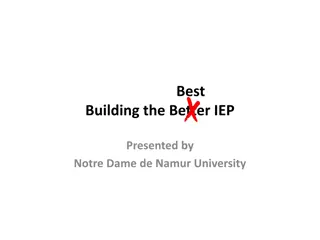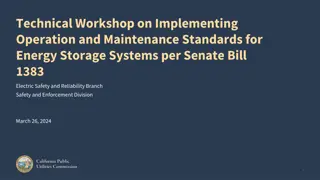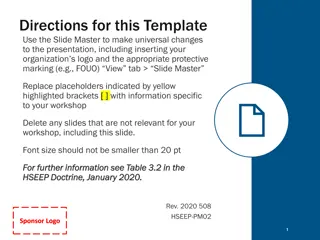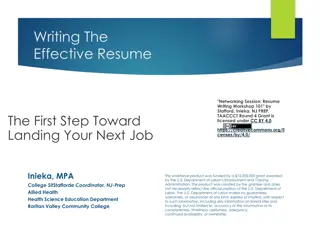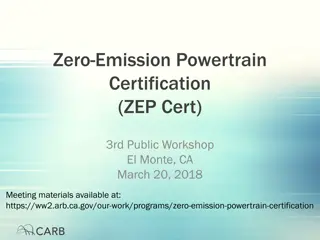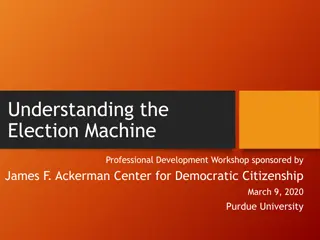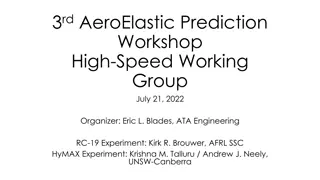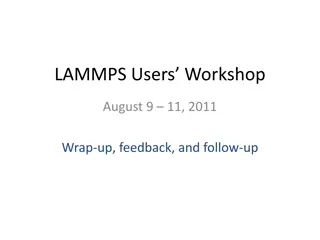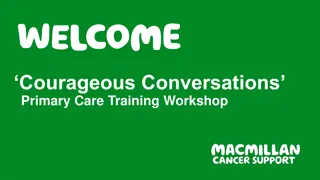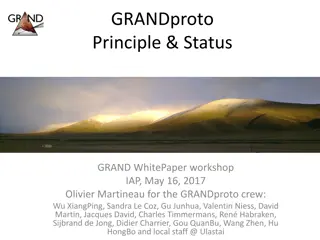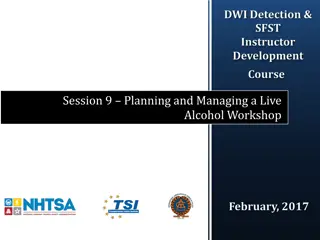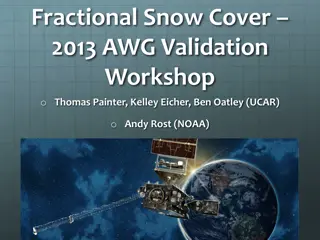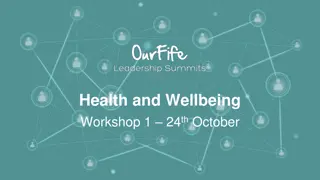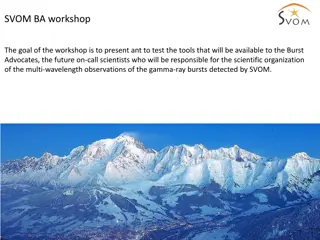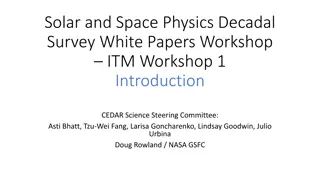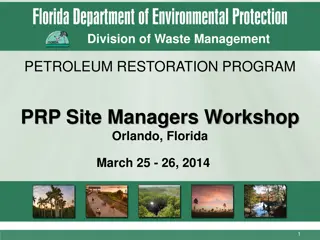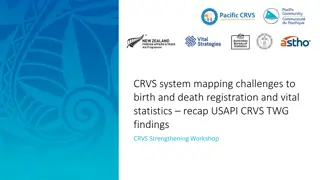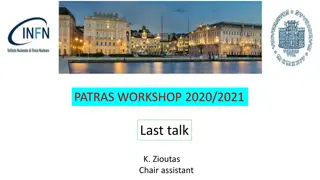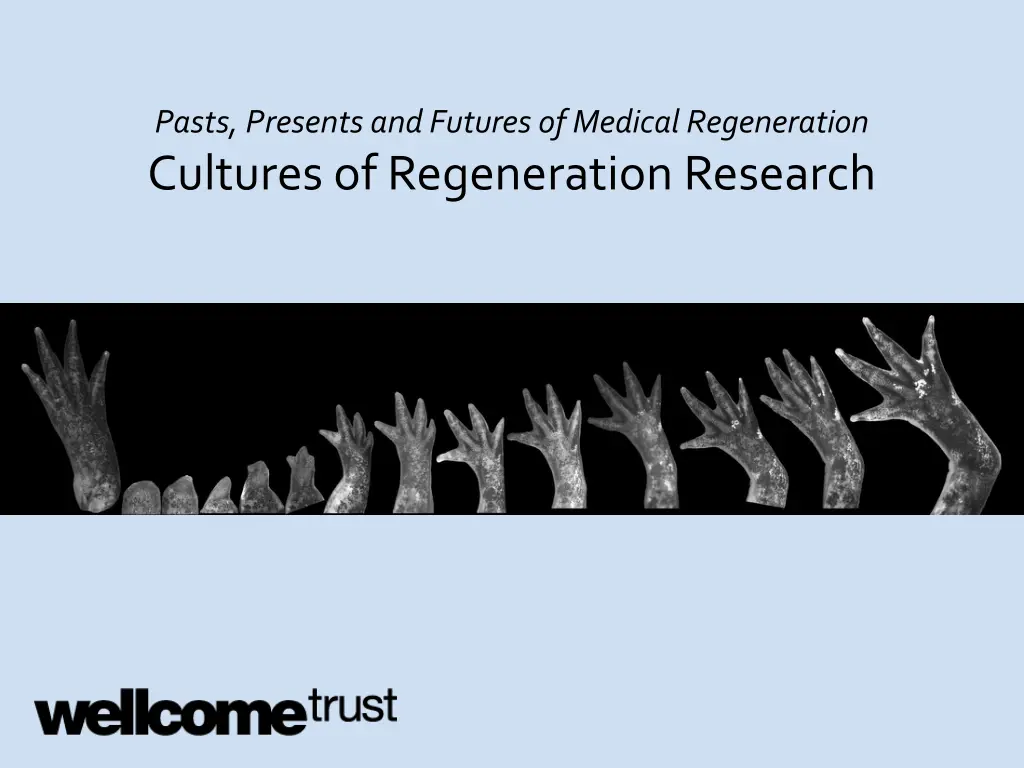
Cultures of Regeneration Research
Explore the past, present, and future of medical regeneration through workshops focusing on key themes such as differences between regeneration, rejuvenation, and enhancement, preventive strategies, regenerative medicine, and age-related considerations. Reflect on the essence of life and the pursuit of vitality in old age. Join us in the quest for youth and active longevity.
Download Presentation

Please find below an Image/Link to download the presentation.
The content on the website is provided AS IS for your information and personal use only. It may not be sold, licensed, or shared on other websites without obtaining consent from the author. If you encounter any issues during the download, it is possible that the publisher has removed the file from their server.
You are allowed to download the files provided on this website for personal or commercial use, subject to the condition that they are used lawfully. All files are the property of their respective owners.
The content on the website is provided AS IS for your information and personal use only. It may not be sold, licensed, or shared on other websites without obtaining consent from the author.
E N D
Presentation Transcript
Pasts, Presents and Futures of Medical Regeneration Cultures of Regeneration Research
Workshop 1 Key Themes The scope of regeneration Differences between regeneration , rejuvenation and enhancement Preventive strategies and reparative practices Ageing and pathology Race, gender, class and psychology
Workshop 2 Key Themes Regeneration as a special problem Enhancement, repair, rehabilitation, restoration Regenerative medicine the application of scientific principles to repair, restore, supplement or replace the natural function of a biological system The Trinity of correct cells, material and stimuli Policy interventions Aspiration, expectations and creative fictions
Workshop 3 It is a mistake to think of life as a mere measure of time. The secret of living is to enjoy all the years that make up one s existence, to remain physically and mentally active until the end comes. There is no virtue in living to be a hundred if, during the final thirty years, one merely exists as a useless, an inactive and an unintelligent organism. The aim of everyone should be to prolong into old age the virility of thought and action which mark the most active period in one s life. George Ryley Scott, The Quest for Youth, 1953
Workshop 3 It is a mistake to think of life as a mere measure of time. The secret of living is to enjoy all the years that make up one s existence, to remain physically and mentally active until the end comes. There is no virtue in living to be a hundred if, during the final thirty years, one merely exists as a useless, an inactive and an unintelligent organism. The aim of everyone should be to prolong into old age the virility of thought and action which mark the most active period in one s life. George Ryley Scott, The Quest for Youth, 1953
Workshop 3 It is a mistake to think of life as a mere measure of time. The secret of living is to enjoy all the years that make up one s existence, to remain physically and mentally active until the end comes. There is no virtue in living to be a hundred if, during the final thirty years, one merely exists as a useless, an inactive and an unintelligent organism. The aim of everyone should be to prolong into old age the virility of thought and action which mark the most active period in one s life. George Ryley Scott, The Quest for Youth, 1953
Workshop 3 It is a mistake to think of life as a mere measure of time. The secret of living is to enjoy all the years that make up one s existence, to remain physically and mentally active until the end comes. There is no virtue in living to be a hundred if, during the final thirty years, one merely exists as a useless, an inactive and an unintelligent organism. The aim of everyone should be to prolong into old age the virility of thought and action which mark the most active period in one s life. George Ryley Scott, The Quest for Youth, 1953
Workshop 3 It is a mistake to think of life as a mere measure of time. The secret of living is to enjoy all the years that make up one s existence, to remain physically and mentally active until the end comes. There is no virtue in living to be a hundred if, during the final thirty years, one merely exists as a useless, an inactive and an unintelligent organism. The aim of everyone should be to prolong into old age the virility of thought and action which mark the most active period in one s life. George Ryley Scott, The Quest for Youth, 1953
Workshop 3 Day 1 Roundtables Do Older People Need Regeneration? Conceptual Cultures of Regeneration Futures? Dementia and Human (Re)generation in Contemporary Culture Day 2 Histories of Seizures in Narrative and Image Soapboxes Where next? What next?
Outcomes Collaborations Researchers Organisations Publications New collections Enlivening existing work Projects Core questions Academic and wider impact
Conceptual Cultures of Regeneration If regenerative medicine is the application of scientific principles to repair, restore, supplement or replace the natural function of a biological system , what is the role of society, culture and policy? If we think of the Trinity as the correct cells, material and stimuli, what implications does this have for perceptions of bodies? Is regeneration a special problem , biologically of socio-culturally? Where do humans fit into the wider biological realm of regeneration ? Where do ideas of regeneration come from? How does regeneration appear in creative fictions? Should we manage expectation of what kinds of regeneration are possible?

